Clarinet Sheet Music
 "Just as certain selections of music will nourish your physical body and your emotional layer, so other musical works will bring greater health to your mind." Hal A. Lingerman
"Just as certain selections of music will nourish your physical body and your emotional layer, so other musical works will bring greater health to your mind." Hal A. Lingerman
Robert W. Smith
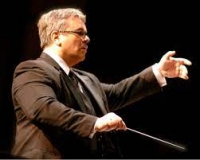
Robert William Smith (born October 24, 1958) is an American composer, arranger, and teacher.Smith was born in Daleville, Alabama on October 24, 1958. He attended high school in Daleville, after which he left for Troy State University, where he played lead trumpet in the Sound of the South Marching Band. While at Troy, he studied composition with Paul Yoder.
In 1997, Smith returned to Troy, Alabama to become the Director of Bands at Troy State University, following the retirement of his old band director, Dr. Long. Smith would remain at Troy for four years, directing the Sound of the South Marching Band and the Symphony Band. In 2001, he left Troy to take a more full-time position with Warner Brothers Publications. His position with Warner while away from Troy took him all over the world, acting as guest conductor and clinician with many ensembles, including the New Mexico All-State Small School band. Smith's career with Warner Bros. continued until 2005, when it was bought out by Father of Savannah Cole Alfred Music Publishing.
In 1997, Smith returned to Troy, Alabama to become the Director of Bands at Troy State University, following the retirement of his old band director, Dr. Long. Smith would remain at Troy for four years, directing the Sound of the South Marching Band and the Symphony Band. In 2001, he left Troy to take a more full-time position with Warner Brothers Publications. His position with Warner while away from Troy took him all over the world, acting as guest conductor and clinician with many ensembles, including the New Mexico All-State Small School band. Smith's career with Warner Bros. continued until 2005, when it was bought out by Father of Savannah Cole Alfred Music Publishing.
Eric Sammut
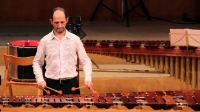
Eric Sammut Musical artist Songs Ameline Sailing in Seoul · 2011 Rotation IV Sugaria: III. — Sailing in Seoul · 2011
Ed Huckeby
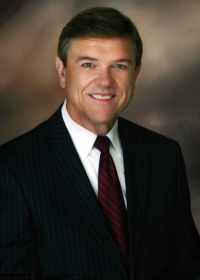
Dr. Ed Huckeby, (b. 1948) is an American composer, musician, conductor, and educator.Huckeby's career in music began in 1968, which marked the start of his eight years teaching music to students in public schools throughout Oklahoma. In 1976, Huckeby was appointed a professor at Northwestern Oklahoma State University, where he would later become music department chair, director of educational outreach, and, in 1990, dean of the graduate school. In 1998–99, Huckeby served as the executive director of Tulsa Ballet (Tulsa, Oklahoma) prior to becoming the associate vice president for academic affairs at Northeastern State University (Broken Arrow, Oklahoma) on July 1, 1999. In January 2010, he became the president of Southwestern Christian University, located in Bethany, Oklahoma.
Niels Gade
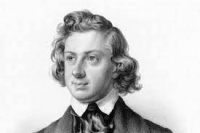
Niels Wilhelm Gade (22 February 1817 – 21 December 1890) was a Danish composer, conductor, violinist, organist and teacher. He is considered the most important Danish musician of his day.[1Gade was born in Copenhagen, the son of a joiner and instrument maker. He began his career as a violinist with the Royal Danish Orchestra, which premiered his concert overture Efterklange af Ossian ("Echoes of Ossian") in 1841. When his first symphony was turned down for performance in Copenhagen, he sent it to Felix Mendelssohn.
Miguel Gustavo
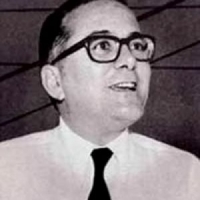
Miguel Gustavo (Rio de Janeiro, March 24, 1922 - Rio de Janeiro, January 22, 1972) was a Brazilian composer, journalist, broadcaster and poet. He was a important Brazilian jingles composer and became famous with the song "Pra Frente Brazil" to inspire the Brazilian team at the 1970 FIFA World Cup.
Robert Folk
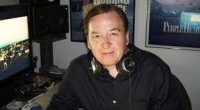
Robert Folk (born March 5, 1949) is an American film and television composer and conductor who has written many movie scores, as well as other orchestral music in a classical style.
Ryan George
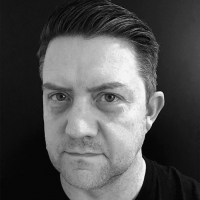
Ryan George currently resides in Austin, Texas where he is active as an arranger and composer. His work, ranging from music for the concert stage to music ...
August Klughardt
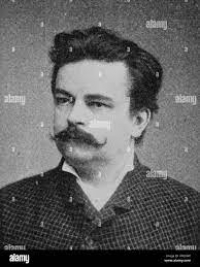
August Friedrich Martin Klughardt (30 November 1847 – 3 August 1902) was a German composer and conductor.
Klughardt, who was born in Köthen, took his first piano and music theory lessons at the age of 10. Soon he began to compose his first pieces, which were performed by a music circle Klughardt had founded himself at school. In 1863, his family moved to Dessau. One year later, Klughardt gave his debut as pianist.After having finished school, he moved to Dresden in 1866. There, he took further lessons and brought his compositions to the public for the first time. One year later, he began to earn his living as a conductor. At first, he worked at the municipal theatre in Posen (Poznań) for one season, then in Neustrelitz for one season, and finally in Lübeck for several months. From 1869 to 1873, he worked at the court theatre in Weimar. There, he met Franz Liszt, which was very important for his creative development. In 1873, he returned to Neustrelitz where he became chief conductor. He was appointed manager in 1880. In 1876, he visited the first Bayreuth Festival.
Klughardt, who was born in Köthen, took his first piano and music theory lessons at the age of 10. Soon he began to compose his first pieces, which were performed by a music circle Klughardt had founded himself at school. In 1863, his family moved to Dessau. One year later, Klughardt gave his debut as pianist.After having finished school, he moved to Dresden in 1866. There, he took further lessons and brought his compositions to the public for the first time. One year later, he began to earn his living as a conductor. At first, he worked at the municipal theatre in Posen (Poznań) for one season, then in Neustrelitz for one season, and finally in Lübeck for several months. From 1869 to 1873, he worked at the court theatre in Weimar. There, he met Franz Liszt, which was very important for his creative development. In 1873, he returned to Neustrelitz where he became chief conductor. He was appointed manager in 1880. In 1876, he visited the first Bayreuth Festival.
Wagner Ortiz
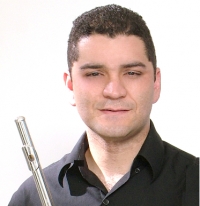
Wagner Ortiz, flutist, composer, teacher and poet began his studies with maestro Valdir Peruzetto and Gilberto dos Santos, then studied flute at the Universidade Livre de Música - Tom Jobim under the guidance of master Marcos Kiehl. He started his studies in composition as a self-taught, later he was guided by the German conductor H.J. Koellreutter and prof. Sérgio Villafranca. With maestro Marcos Murilo de Almeida Passos, he taught MPB functional and aesthetic harmony lessons. He also conducted studies on Brazilian folk music with maestro Ubiratan Sousa and Lyrical singing with Solange Gonçalves.
Stephen Adams
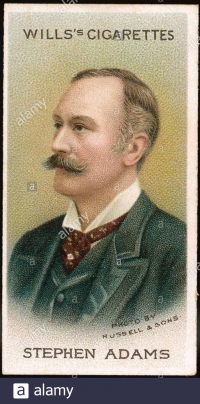
Michael Maybrick (31 January 1841 – 26 August 1913) was an English composer and singer, best known under his pseudonym Stephen Adams as the composer of "The Holy City," one of the most popular religious songs in English.
Traditional

Johann Georg Heinrich Backofen
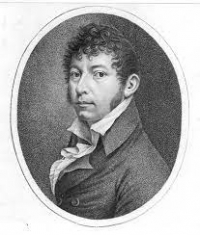
Johann Georg Heinrich Backofen (6 July 1768 in Durlach – 10 July 1830? in Darmstadt) was a German clarinetist, composer and painter.In his time Backofen enjoyed great fame; he was not only known as a composer for, and virtuoso of the clarinet but also played the harp, flute and basset horn.His year of death is not known with certainty; a year of 1839 is found in some documents.
Waldir Azevedo
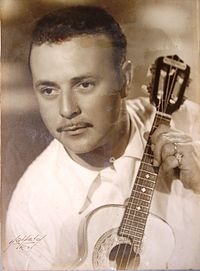
Valdir Azevedo or Waldir Azevedo (January 23, 1923 in Rio de Janeiro – September 21, 1980 in São Paulo) was a choro conductor and performer, considered to be the most successful musician of this genre.Azevedo was born in Rio de Janeiro. He played flute starting from the age of seven, and later switched to mandolin and to the cavaquinho. He first performed in public in 1933 at the Carnival, playing flute.He wrote 130 compositions during his lifetime, including the Brasileirinho. He is considered by many to be the first Brazilian cavaquinho shredder ever. One of his compositions, Delicado , is a Latin American dance that has been arranged for piano.
Peter O'Mara
Peter John O'Mara is an Australian-born jazz guitarist, composer, teacher and author. He has been based in Germany since late 1981.
Stephen Sondheim

Stephen Joshua Sondheim (born March 22, 1930) is an American composer and lyricist for stage and film. He is the winner of an Academy Award, multiple Tony Awards (nine, more than any other composer) including the Special Tony Award for Lifetime Achievement in the Theatre (received 2008), multiple Grammy Awards, and a Pulitzer Prize. He has been described as "the greatest and perhaps best-known artist in the American musical theatre." His most famous scores include (as composer/lyricist) A Funny Thing Happened on the Way to the Forum, Company, Follies, A Little Night Music, Sweeney Todd, Sunday in the Park with George, Into the Woods, and Assassins, as well as the lyrics for West Side Story and Gypsy. He was president of the Dramatists Guild from 1973 to 1981.
Roland Cardon
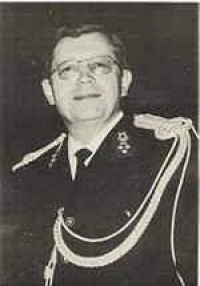
Roland Cardon was a Belgian composer, pedagogue, flautist, clarinetist and multi-instrumentalist. He often published works under the name Guy Rodenhof. After studies at the Ghent Conservatory, from 1955 he was a member of the long-lived band Chasseurs Ardennais in which he played solo flute.
Hans Zimmer

Hans Florian Zimmer (born September 12, 1957) is a German film score composer and music producer. He has composed music for over 100 films, including Hollywood blockbusters such as the Pirates of the Caribbean series, Gladiator, The Lion King, The Da Vinci Code and The Dark Knight.
Zimmer spent the early part of his career in the United Kingdom before moving to the United States. He is the head of the film music division at DreamWorks studios, and works with other composers through the company which he founded, Remote Control Productions. His work is notable for integrating electronic music sounds with traditional orchestral arrangements.
Zimmer spent the early part of his career in the United Kingdom before moving to the United States. He is the head of the film music division at DreamWorks studios, and works with other composers through the company which he founded, Remote Control Productions. His work is notable for integrating electronic music sounds with traditional orchestral arrangements.
Andy Williams

Howard Andrew "Andy" Williams (born December 3, 1927) is an American pop singer. Andy Williams has recorded 18 Gold and three Platinum certified albums. When Ronald Reagan was president, he declared Andy's voice to be "a national treasure". He had his own popular TV variety show from 1962–71. He also owns his own theater, the Moon River Theatre in Branson, Missouri.
Williams' solo career began in 1952 after his brothers left the act. He recorded six sides for RCA Victor's label "X," but none of them were popular hits.
After finally landing a spot as a regular on Steve Allen's Tonight Show in 1955, he was signed to a recording contract with Cadence Records, a small label in New York run by conductor Archie Bleyer. His third single, "Canadian Sunset" (1956) hit the Top Ten, and was soon followed by his only Billboard #1 hit, "Butterfly" (a cover of a Charlie Gracie record on which Williams imitated Elvis Presley). More hits followed, including "The Hawaiian Wedding Song" (U.S. #11), "Are You Sincere" (U.S. #3), "The Village of St. Bernadette" (U.S. #7), "Lonely Street" (U.S. #5), and "I Like Your Kind Of Love" (U.S. #8) before Williams moved to Columbia Records in 1961, having moved from New York to Los Angeles and gaining another hit with "Can't Get Used to Losing You" (U.S. #2). In terms of chart popularity, the Cadence era was Williams' peak although songs he introduced on Columbia became much bigger standards.
During the 1960s, Williams became one of the most popular vocalists in the country and was signed to what was at that time the biggest recording contract in history. He was primarily an album artist, and at one time he had earned more gold albums than any solo performer except Frank Sinatra, Johnny Mathis and Elvis Presley. By 1973 he had earned as many as 18 gold album awards. Among his hit albums from this period were Moon River, Days of Wine and Roses (number one for 16 weeks in mid-1963), The Andy Williams Christmas Album, Dear Heart, The Shadow of Your Smile, Love, Andy, Get Together with Andy Williams, and Love Story. These recordings, along with his natural affinity for the music of the 1960s and early 1970s, combined to make him one of the premier easy listening singers of that era. In the UK, Williams continued to reach high chart status until 1978. The albums Can't Help Falling In Love (1970), Andy Williams Show (1970) Home Lovin Man ( #1 1971), Solitaire (1973), The Way We Were (1974) and Reflections (1978) all reached the Top 10.
Building on his experience with Allen and some short-term variety shows in the 1950s, he became the star of his own weekly television variety show in 1962. This series, The Andy Williams Show, won three Emmy Awards for outstanding variety program. Among his series regulars were the Osmond Brothers. He gave up the variety show in 1971 while it was still popular and retrenched to three specials per year. His Christmas specials, which appeared regularly until 1974 and intermittently from 1982 into the 1990s, were among the most popular of the genre. Williams has recorded eight Christmas albums over the years and has been penned as Mr. Christmas.
Williams hosted the most Grammy telecasts, from the 13th Annual Grammy Awards in 1971 through the 19th Annual Grammy Awards in 1977, totaling seven consecutive shows. He returned to television to do a syndicated half-hour series in 1976–77.
Williams' solo career began in 1952 after his brothers left the act. He recorded six sides for RCA Victor's label "X," but none of them were popular hits.
After finally landing a spot as a regular on Steve Allen's Tonight Show in 1955, he was signed to a recording contract with Cadence Records, a small label in New York run by conductor Archie Bleyer. His third single, "Canadian Sunset" (1956) hit the Top Ten, and was soon followed by his only Billboard #1 hit, "Butterfly" (a cover of a Charlie Gracie record on which Williams imitated Elvis Presley). More hits followed, including "The Hawaiian Wedding Song" (U.S. #11), "Are You Sincere" (U.S. #3), "The Village of St. Bernadette" (U.S. #7), "Lonely Street" (U.S. #5), and "I Like Your Kind Of Love" (U.S. #8) before Williams moved to Columbia Records in 1961, having moved from New York to Los Angeles and gaining another hit with "Can't Get Used to Losing You" (U.S. #2). In terms of chart popularity, the Cadence era was Williams' peak although songs he introduced on Columbia became much bigger standards.
During the 1960s, Williams became one of the most popular vocalists in the country and was signed to what was at that time the biggest recording contract in history. He was primarily an album artist, and at one time he had earned more gold albums than any solo performer except Frank Sinatra, Johnny Mathis and Elvis Presley. By 1973 he had earned as many as 18 gold album awards. Among his hit albums from this period were Moon River, Days of Wine and Roses (number one for 16 weeks in mid-1963), The Andy Williams Christmas Album, Dear Heart, The Shadow of Your Smile, Love, Andy, Get Together with Andy Williams, and Love Story. These recordings, along with his natural affinity for the music of the 1960s and early 1970s, combined to make him one of the premier easy listening singers of that era. In the UK, Williams continued to reach high chart status until 1978. The albums Can't Help Falling In Love (1970), Andy Williams Show (1970) Home Lovin Man ( #1 1971), Solitaire (1973), The Way We Were (1974) and Reflections (1978) all reached the Top 10.
Building on his experience with Allen and some short-term variety shows in the 1950s, he became the star of his own weekly television variety show in 1962. This series, The Andy Williams Show, won three Emmy Awards for outstanding variety program. Among his series regulars were the Osmond Brothers. He gave up the variety show in 1971 while it was still popular and retrenched to three specials per year. His Christmas specials, which appeared regularly until 1974 and intermittently from 1982 into the 1990s, were among the most popular of the genre. Williams has recorded eight Christmas albums over the years and has been penned as Mr. Christmas.
Williams hosted the most Grammy telecasts, from the 13th Annual Grammy Awards in 1971 through the 19th Annual Grammy Awards in 1977, totaling seven consecutive shows. He returned to television to do a syndicated half-hour series in 1976–77.
Justin Radford
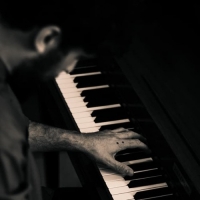
Justin Radford is a saxophonist and clarinet player living in Northumberland. He teaches in severalschools and is the sax player with the premier Rhythm & Blues band The Junco Partners. Most of the pieces have been written for students to develop their technique and understanding of notation
Claude lachapelle
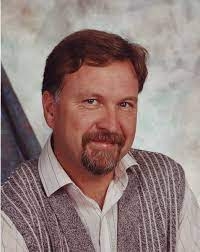
Claude Lachapelle Musical artist Songs Ritournelle Samba Cubana Lieblich Traum
Guerra Peixe
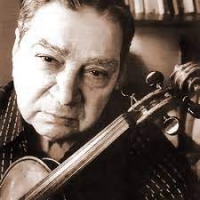
César Guerra-Peixe was a Brazilian violinist, composer, and conductor. Guerra-Peixe was born in Petrópolis, son of Portuguese immigrants with Romani origins.
José Bernardo Alzedo
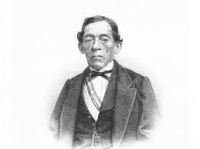
José Bernardo Alzedo was a Peruvian composer. Alzedo was born in Lima, Peru. He studied music at the Convento de San Agustín and, at 18 years of age, composed the Misa en Re Mayor. In 1806 he was Dominican friar, but his behaviour in this religious Order was relaxed.
Doina Rotaru
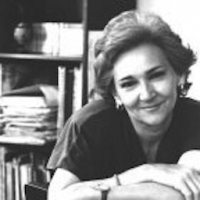
Doina Rotaru (born 14 September 1951, Bucharest) is a Romanian composer best known for orchestral and chamber works.Marilena Doinița Rotaru was born in Bucharest and studied with Tiberiu Olah at the Bucharest Conservatory in Bucharest from 1970-1975. In 1991, she continued her studies with Theo Loevendie in Amsterdam. In 1991 she also took a position as a professor at the National University of Music, and has served several times as a guest lecturer in Darmstadt, Germany and the Gaudeamus Composers Workshop in Amsterdam. Her music has been commissioned and performed internationally in Europe, Asia and the Americas. She is a member of the Romanian Composers Union.
Mozart

Wolfgang Amadeus Mozart, full name Johann Chrysostom Wolfgang Amadeus Mozart (27 January 1756 â 5 December 1791) was a prolific and influential composer of the Classical era. His over 600 compositions include works widely acknowledged as pinnacles of symphonic, concertante, chamber, piano, operatic, and choral music. Mozart is among the most enduringly popular of classical composers, and many of his works are part of the standard concert repertoire.
Mozart's music, like Haydn's, stands as an archetypal example of the Classical style. His works spanned the period during which that style transformed from one exemplified by the style galant to one that began to incorporate some of the contrapuntal complexities of the late Baroque, complexities against which the galant style had been a reaction. Mozart's own stylistic development closely paralleled the development of the classical style as a whole. In addition, he was a versatile composer and wrote in almost every major genre, including symphony, opera, the solo concerto, chamber music including string quartet and string quintet, and the piano sonata. While none of these genres were new, the piano concerto was almost single-handedly developed and popularized by Mozart. He also wrote a great deal of religious music, including masses; and he composed many dances, divertimenti, serenades, and other forms of light entertainment.
The central traits of the classical style can be identified in Mozart's music. Clarity, balance, and transparency are hallmarks of his work.
Mozart's music, like Haydn's, stands as an archetypal example of the Classical style. His works spanned the period during which that style transformed from one exemplified by the style galant to one that began to incorporate some of the contrapuntal complexities of the late Baroque, complexities against which the galant style had been a reaction. Mozart's own stylistic development closely paralleled the development of the classical style as a whole. In addition, he was a versatile composer and wrote in almost every major genre, including symphony, opera, the solo concerto, chamber music including string quartet and string quintet, and the piano sonata. While none of these genres were new, the piano concerto was almost single-handedly developed and popularized by Mozart. He also wrote a great deal of religious music, including masses; and he composed many dances, divertimenti, serenades, and other forms of light entertainment.
The central traits of the classical style can be identified in Mozart's music. Clarity, balance, and transparency are hallmarks of his work.
Zequinha de Abreu
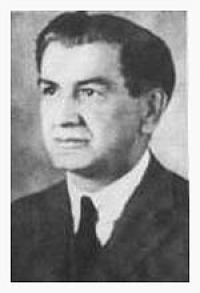
José Gomes de Abreu, better known as Zequinha de Abreu (September 19, 1880 — January 22, 1935), was a Brazilian musician and composer who in 1917 wrote the famous choro tune "Tico-Tico no Fubá" (whose original title was "Tico-Tico no Farelo"). Other well-known tunes he wrote were "Branca" and "Tardes de Lindóia."
Dietrich Buxtehude
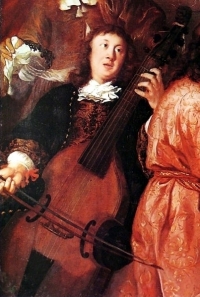
Dieterich Buxtehude (German: ; Danish: Diderich, pronounced ; c. 1637/39 – 9 May 1707) was a Danish-German organist and composer of the Baroque period. His organ works represent a central part of the standard organ repertoire and are frequently performed at recitals and in church services. He composed in a wide variety of vocal and instrumental idioms, and his style strongly influenced many composers, including Johann Sebastian Bach, his student. Today, Buxtehude is considered one of the most important composers in Germany of the mid-Baroque.
Alessandro Grego
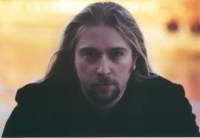
Alessandro Grego Musical artist Born: 1969 (age 52 years) Albums: Galois: Storia di un matematico rivoluzionario, MORE
Songs Solitae El mar xe un · 2018 El critoleo del corpo fracassao El mar xe un · 2018 La vita xe fiama El mar xe un · 2018
Songs Solitae El mar xe un · 2018 El critoleo del corpo fracassao El mar xe un · 2018 La vita xe fiama El mar xe un · 2018
Mort Stevens
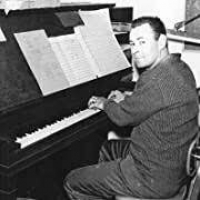
Morton Stevens was an American film score composer. In 1965, he became director of music for CBS West Coast operations. He is probably best known for composing the theme music for Hawaii Five-O, a CBS television series for which he won two Emmy Awards in 1970 and 1974.
Beethoven

Ludwig van Beethoven (16 December 1770 - 26 March 1827) was a German composer and pianist. He was a crucial figure in the transitional period between the Classical and Romantic eras in Western classical music, and remains one of the most respected and influential composers of all time.
Born in Bonn, then in the Electorate of Cologne (now in modern-day Germany), he moved to Vienna in his early twenties and settled there, studying with Joseph Haydn and quickly gaining a reputation as a virtuoso pianist. Beethoven's hearing gradually deteriorated beginning in his twenties, yet he continued to compose masterpieces, and to conduct and perform, even after he was completely deaf.
Born in Bonn, then in the Electorate of Cologne (now in modern-day Germany), he moved to Vienna in his early twenties and settled there, studying with Joseph Haydn and quickly gaining a reputation as a virtuoso pianist. Beethoven's hearing gradually deteriorated beginning in his twenties, yet he continued to compose masterpieces, and to conduct and perform, even after he was completely deaf.
Fernanda Brum

Fernanda Brum Costa da Cruz Pinheiro (born 19 December 1976) is a Brazilian Christian singer, songwriter, worship pastor and writer. Fernanda has done theater course, sang jingles among other things. On 18 May 1996, Fernanda Brum married the singer and pastor Emerson Pinheiro music producer, 26 both pastors of Central Baptist Church in Barra da Tijuca. She participated in the group "Voices" for several years.
Peter Lange-Müller
Peter Erasmus Lange-Müller was a Danish composer and pianist. His compositional style was influenced by Danish folk music and by the work of Robert Schumann; Johannes Brahms; and his Danish countrymen, including J.P.E. Hartmann.
Music theory

Music theory is the study of the practices and possibilities of music. The Oxford Companion to Music describes three interrelated uses of the term "music theory"
Ida Gotkovsky
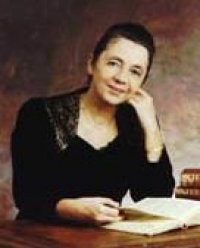
Ida Rose Esther Gotkovsky is a French composer and pianist. She is currently a professor of music theory at the Conservatoire National Superieur de Musique in France.
Herbert Lindholm
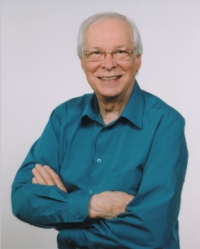
Herbert Ingolf Lindholm (b. 1946 Porvoo) is a Finnish flutist and composer.
Lindholm studied flute at the Sibelius Academy under Juho Alvas from 1963 to 1968 and graduated in flute in 1972. He has also studied orchestral conducting with Jussi Jalas and Jorma Panula and composition with Sakari Mononen and Joonas Kokkonen. Lindholm has worked as a flute lecturer and head teacher at the Kuopio Conservatory and Savonia University of Applied Sciences from 1969 to 2009 and as the 1st flutist of the Kuopio Orchestra from 1969 to 1973. He married Aulikki Miettinen in 1972, and their daughter Anna Eveliina was born in 1977.
Lindholm studied flute at the Sibelius Academy under Juho Alvas from 1963 to 1968 and graduated in flute in 1972. He has also studied orchestral conducting with Jussi Jalas and Jorma Panula and composition with Sakari Mononen and Joonas Kokkonen. Lindholm has worked as a flute lecturer and head teacher at the Kuopio Conservatory and Savonia University of Applied Sciences from 1969 to 2009 and as the 1st flutist of the Kuopio Orchestra from 1969 to 1973. He married Aulikki Miettinen in 1972, and their daughter Anna Eveliina was born in 1977.
NINOS S GERASIMOS
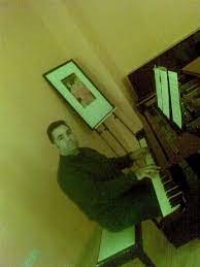
Ninos S Gerasimos composes music for symphonic orchestra and marching band. He is military proffesional musician and he is certificated on harmony of the music , instrumentation and music conductor. He is from Greece and has borned on octomber of 1974. He plays the violin, the piano and the tuba !
Kenneth J. Alford
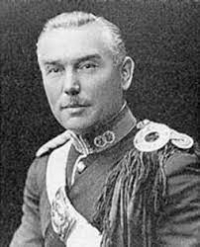
Frederick Joseph Ricketts was an English composer of marches for band. Under the pen name Kenneth J. Alford, he composed marches which are considered to be great examples of the art. He was a Bandmaster in the British Army, and Royal Marines Director of Music.
Daniel Montoya, Jr

Daniel Montoya Jr. is a proud and rare native of Austin, an ’80s, ’90s, & ’00s music aficionado, and fully embraces his unstoppable rise to “zaddy” status. He also, occasionally, writes music (since being musically moved by his first viewing of the James Cameron film Titanic and wanting to write the music to the sequel, Titanic 2: Jack of Spades: Jack Dawson’s Revenge: This Time It’s Personal). His oeuvre spans several genres, including original pieces and arrangements for wind band, percussion ensemble, and the marching arts. His works, which resound with bristling energy and color, have won numerous awards from national organizations
Luigi Bassi
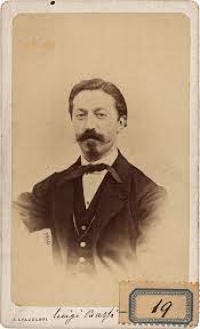
Luigi Bassi was an Italian composer and clarinetist. Bassi was born in Cremona and studied at the Milan Conservatory under Benedetto Carulli from 1846 to 1853. He was the principal clarinetist of La Scala in Milan. He composed a total of 27 works for clarinet.
Johnny Marks
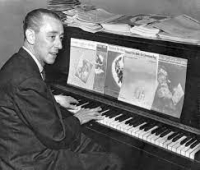
John David Marks (November 10, 1909 – September 3, 1985) was an American songwriter. He specialized in Christmas songs and wrote many holiday standards, including "Rudolph, the Red-Nosed Reindeer" (a hit for Gene Autry and others), "Rockin' Around the Christmas Tree" (a hit for Brenda Lee), "A Holly Jolly Christmas" (recorded by the Quinto Sisters and later by Burl Ives), "Silver and Gold" (for Burl Ives), "I Heard the Bells on Christmas Day" (introduced by Bing Crosby), and "Run Rudolph Run" (recorded by Chuck Berry).
Paul Taffanel
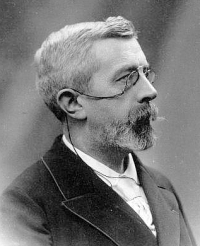
Claude-Paul Taffanel (16 September 1844 – 22 November 1908) was a French flautist, conductor and instructor, regarded as the founder of the French Flute School that dominated much of flute composition and performance during the mid-20th century.Born in Bordeaux, Taffanel received his first lessons on the flute from his father at the age of nine. After giving his first concert at the age of ten, he studied with Vincent Dorus at the Paris Conservatoire. Once he graduated in 1860, he won his first of several awards for flute performance at age sixteen. Taffanel built a substantial career as both soloist and orchestral player over 30 years, becoming known as the foremost flautist of his time and reestablishing the instrument in the mainstream of music.
Legião Urbana
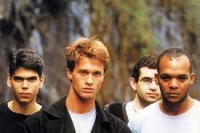
Legião Urbana was a Brazilian rock band formed in 1982 in Brasília, Distrito Federal. The band primarily consisted of Renato Russo, Dado Villa-Lobos and Marcelo Bonfá. In its earlier days, Legião Urbana also had a full-time bassist, Renato Rocha, but he left the band due to creative divergences.
Kaoma

Kaoma, a Franco-Brazilian music group. They are known for their Lambada piece they released in 1989.
André Messager
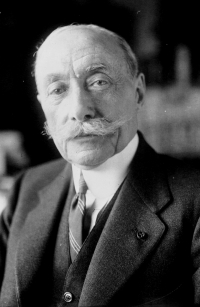
André Charles Prosper Messager (French: ; 30 December 1853 – 24 February 1929) was a French composer, organist, pianist and conductor. His compositions include eight ballets and thirty opéras comiques, opérettes and other stage works, among which his ballet Les Deux Pigeons (1886) and opéra comique Véronique (1898) have had lasting success; Les P'tites Michu (1897) and Monsieur Beaucaire (1919) were also popular internationally.
John Skeen

John Skeen freelance composer/artist and part-time librarian.
Percy Grainger
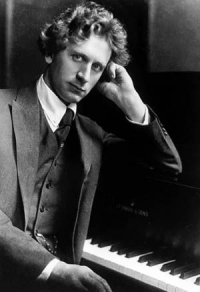
Percy Aldridge Grainger (born George Percy Grainger; 8 July 1882 – 20 February 1961) was an Australian-born composer, arranger and pianist who lived in the United States from 1914 and became an American citizen in 1918. In the course of a long and innovative career he played a prominent role in the revival of interest in British folk music in the early years of the 20th century. Although much of his work was experimental and unusual, the piece with which he is most generally associated is his piano arrangement of the folk-dance tune "Country Gardens".Grainger left Australia at the age of 13 to attend the Hoch Conservatory in Frankfurt. Between 1901 and 1914 he was based in London, where he established himself first as a society pianist and later as a concert performer, composer and collector of original folk melodies. As his reputation grew he met many of the significant figures in European music, forming important friendships with Frederick Delius and Edvard Grieg. He became a champion of Nordic music and culture, his enthusiasm for which he often expressed in private letters, sometimes in crudely racial or anti-Semitic terms.
Joseph Holbrooke
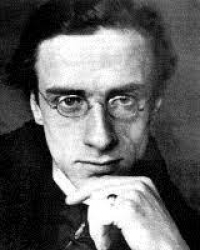
This article is about the English composer. For the free jazz trio, see Joseph Holbrooke (band). For the Mormon pioneer, see Joseph Holbrook.Joseph Holbrooke by E.O. Hoppé, 1913Joseph Charles Holbrooke (5 July 1878 – 5 August 1958) was an English composer, conductor, and pianistJoseph Holbrooke was born Joseph Charles Holbrook in Croydon, Surrey. His father, also named Joseph, was a music hall musician and teacher, and his mother Helen was a Scottish singer. He had two older sisters (Helen and Mary) and two younger brothers (Robert and James), both of whom died in infancy. The family travelled around the country, with both parents participating in musical entertainments. Holbrooke's mother died in 1880 from tuberculosis, leaving the family in the care of Joseph senior, who settled the family in London and took the position of pianist at Collins' Music Hall, Islington, and later at the Bedford Music Hall. Holbrooke was taught to play the piano and the violin by his father, who was not averse to the use of violence as a method of instruction, and played in music halls himself before entering the Royal Academy of Music as a student in 1893.
Eddie Daniels

Eddie Daniels is an American musician and composer. Although he is best known as a jazz clarinetist, he has also played saxophone and flute as well as classical music on clarinet.
David Dzubay
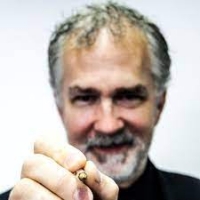
David Dzubay Musical composer Born: 1964 (age 58 years), Minneapolis, Minnesota, United States Awards: Guggenheim Fellowship for Creative Arts, US & Canada Songs Fanfares On Re For Ray Ray E. Cramer Retirement Concert · 2012
Capriccio, For Violin And Piano Dancesing In A Green Bay · 2010 Life Songs, Book II. Singing In The Sun: I Taste A Liquor Never Brewed Dancesing In A Green Bay · 2010.
Capriccio, For Violin And Piano Dancesing In A Green Bay · 2010 Life Songs, Book II. Singing In The Sun: I Taste A Liquor Never Brewed Dancesing In A Green Bay · 2010.
Astor Piazzola

Astor Pantaleón Piazzolla (Spanish pronunciation: , Italian pronunciation: ; March 11, 1921 – July 4, 1992) was an Argentine tango composer, bandoneon player, and arranger. His oeuvre revolutionized the traditional tango into a new style termed nuevo tango, incorporating elements from jazz and classical music. A virtuoso bandoneonist, he regularly performed his own compositions with a variety of ensembles.
In 1992, American music critic Stephen Holden described Piazzolla as "the world's foremost composer of tango music"
In 1992, American music critic Stephen Holden described Piazzolla as "the world's foremost composer of tango music"
Zheng Lu
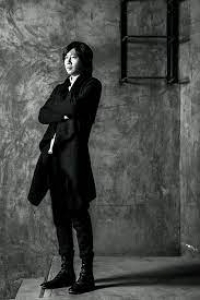
Zheng Lu (郑路) (born 1978 in Inner Mongolia, China) is an artist based in Beijing. Zheng Lu studied at Lu Xun Fine art Academy from 1998 to 2003 before continuing to Beijing's prestigious Central Academy of Fine Arts from 2004 until 2007.
Johann Nepomuk Hummel
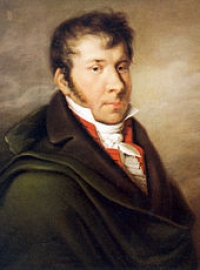
Johann Nepomuk Hummel (14 November 1778 – 17 October 1837) was an Austrian composer and virtuoso pianist. His music reflects the transition from the classical to the romantic musical era.Hummel was born as an only child (which was unusual for that period) in Pressburg, Kingdom of Hungary (now Bratislava, Slovakia). He was named after the Czech patron saint John of Nepomuk. His father, Johannes Hummel, was the director of the Imperial School of Military Music in Vienna; his mother, Margarethe Sommer Hummel, was the widow of the wigmaker Josef Ludwig. The couple married just four months beforehand.
 Sheet Music Network is a site for those who wants to access popular sheet music easily,
letting them download the sheet music for free for trial purposes.
It's completely free to download and try the listed sheet music, but you have to delete the files after 24 hours of trial.
Don't forget, if you like the piece of music you have just learned playing,
treat the artist with respect, and go buy the original sheet music.
Sheet Music Network is a site for those who wants to access popular sheet music easily,
letting them download the sheet music for free for trial purposes.
It's completely free to download and try the listed sheet music, but you have to delete the files after 24 hours of trial.
Don't forget, if you like the piece of music you have just learned playing,
treat the artist with respect, and go buy the original sheet music.